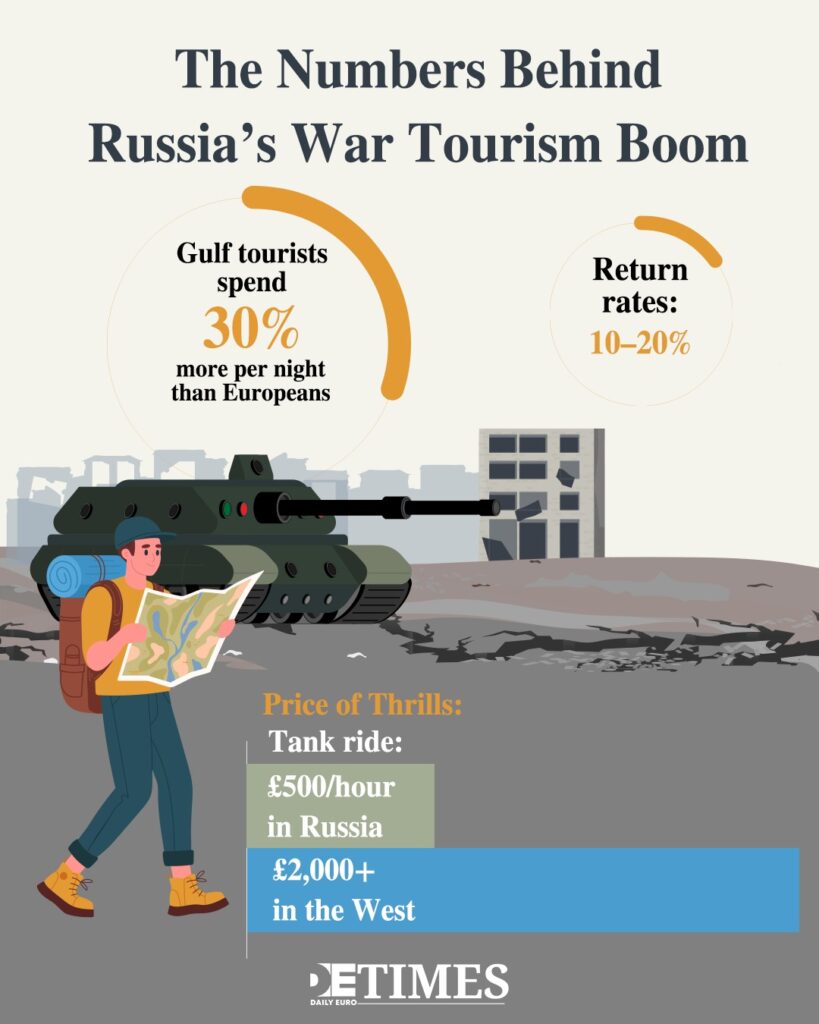A Saudi businessman spending his weekend not on a yacht, but firing Kalashnikovs and maneuvering a Soviet tank through muddy fields outside Moscow would sound uncanny. That happened just last month with Gulf tourists.
It's part of a bigger shift. Russian hotel bookings from Middle Eastern tourists jumped by 30% in early 2025. Today, nearly one out of every five foreign tourists in Russia is from the Gulf. This isn't just a change in vacation plans; it's a story about changing global relationships.
The Allure of the Russian Adventure
So, what’s driving this trend? Geopolitics has opened new doors. As Gulf states have strengthened their economic ties with Moscow, traditional European hotspots have lost some of their appeal.
Military-themed tourism fills a unique niche that simply isn’t available in the West. Companies like Tank-Tour have operated for nearly a decade, offering everything from weapon handling to tactical training. And thanks to social media campaigns on TikTok and Instagram, these activities have become seriously trendy among young Gulf nationals.
It’s also a partnership of economic necessity. Russia needs foreign currency amid Western sanctions, while Gulf states are keen to diversify their tourism and show a more independent streak from traditional Western alliances.
Luxury Thrills Without the Sky-High Price Tag
These aren’t budget travelers. Gulf tourists famously spend about 30% more per night than European visitors, opting for five-star hotels and custom, high-end military experiences that can cost thousands daily.
And Russia offers incredible value. Where else can you drive a tank for £500 an hour? Similar experiences in private Western facilities can run upwards of £2,000. To cater to this demand, companies have expanded their offerings to include helicopter flights, submarine tours, and even simulated special forces training.
This trend is spreading through the most powerful marketing tool there is: word of mouth. Stories of these unique Moscow adventures are shared in business networks and at exclusive gatherings. The proof is in the return rates, which are a impressive 10-20%.

More Than Just Tourism: Building Cultural Bridges
While some observers raise eyebrows at the idea of Gulf citizens learning military tactics in Russia, most participants see it as an extreme sport, not a training exercise.
The boom is creating genuine, personal connections. Language barriers seem to melt away when you're handling weapons or tackling an obstacle course together. These shared experiences build friendships that can outlast political disagreements.
Russia is actively courting this market, too, through embassy partnerships and expanded airline routes. You can now catch direct flights year-round from Dubai, Riyadh, and Kuwait City to Moscow and Saint Petersburg.
Ripple Effects in the Economy
This tourism surge is opening doors for much broader cooperation. Tourist money is paving the way for investments in hotels, restaurant chains, and luxury retail ventures.
Gulf airlines have launched those new routes to Russian cities, creating opportunities for cargo services alongside passenger travel. Perhaps most importantly, it gives Russian energy companies and officials informal diplomatic channels in a region where American influence has long been dominant.
Sometimes, personal relationships built over a tank ride can be more persuasive than formal diplomacy.
What’s Next for Adventure Tourism?
Russia isn’t stopping here. There are plans to expand military tourism beyond the major cities into the wilds of Siberia, offering Arctic survival training and submarine experiences in the White Sea.
Meanwhile, Gulf tourism operators are looking at partnerships to bring similar experiences closer to home; desert warfare training and armored vehicle rides for adventure-seekers in the Middle East.
This niche market’s success is already inspiring others. Countries like Belarus, Kazakhstan, and Armenia have started marketing their own military-themed tours to a Gulf audience eager for the next big thrill.
Keep up with Daily Euro Times for more updates!
Read also:
MENA-Asia Tourism Boom: Europeans Want Sophistication
Tourists Under Fire: Europe’s North-South Economic Divide Alight
Tourism in Afghanistan: Between Reality and Taliban Propaganda






